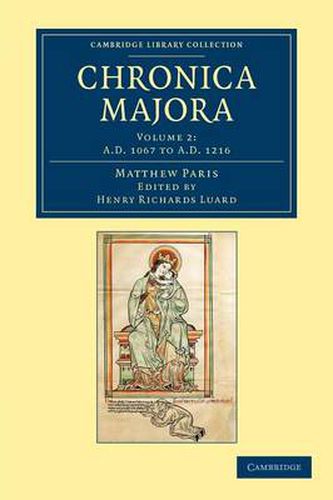Readings Newsletter
Become a Readings Member to make your shopping experience even easier.
Sign in or sign up for free!
You’re not far away from qualifying for FREE standard shipping within Australia
You’ve qualified for FREE standard shipping within Australia
The cart is loading…






A Church of England clergyman and fellow of Trinity College, Cambridge, Henry Richards Luard (1825-91) edited a number of works in the Rolls Series, for which he was noted for the quality of his indexing and the depth of his commentary. This seven-volume work, first published between 1872 and 1883, has been hailed as one of the best editions in the series. It is a rich source for English history from the Creation to 1259, written by England’s greatest medieval historian. Matthew Paris (c.1200-59) became a monk at St Albans in 1217 and had access to a wide variety of documents as an acquaintance of such men as Bishop Robert Grosseteste and King Henry III, whom he knew well. Volume 2, covering 1067-1216, derives mainly from the work of Roger of Wendover, and is particularly fascinating in its discussion of the background to Magna Carta.
$9.00 standard shipping within Australia
FREE standard shipping within Australia for orders over $100.00
Express & International shipping calculated at checkout
A Church of England clergyman and fellow of Trinity College, Cambridge, Henry Richards Luard (1825-91) edited a number of works in the Rolls Series, for which he was noted for the quality of his indexing and the depth of his commentary. This seven-volume work, first published between 1872 and 1883, has been hailed as one of the best editions in the series. It is a rich source for English history from the Creation to 1259, written by England’s greatest medieval historian. Matthew Paris (c.1200-59) became a monk at St Albans in 1217 and had access to a wide variety of documents as an acquaintance of such men as Bishop Robert Grosseteste and King Henry III, whom he knew well. Volume 2, covering 1067-1216, derives mainly from the work of Roger of Wendover, and is particularly fascinating in its discussion of the background to Magna Carta.